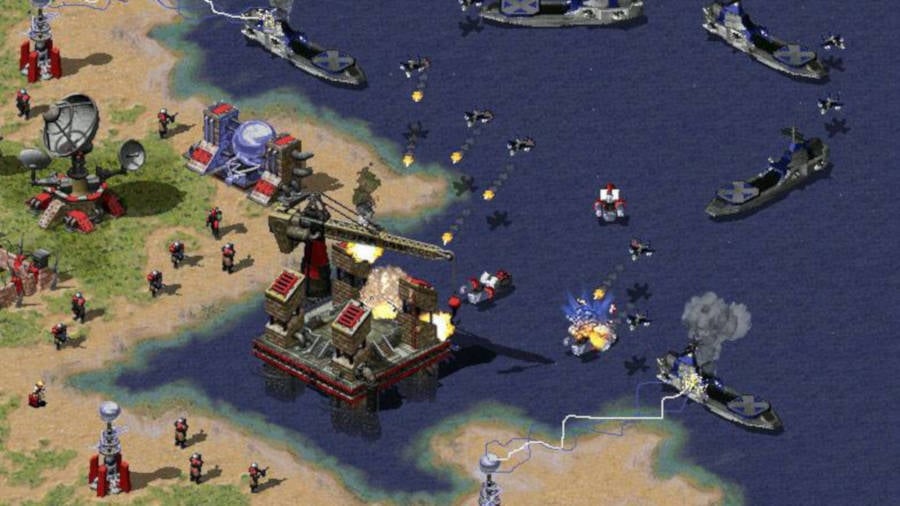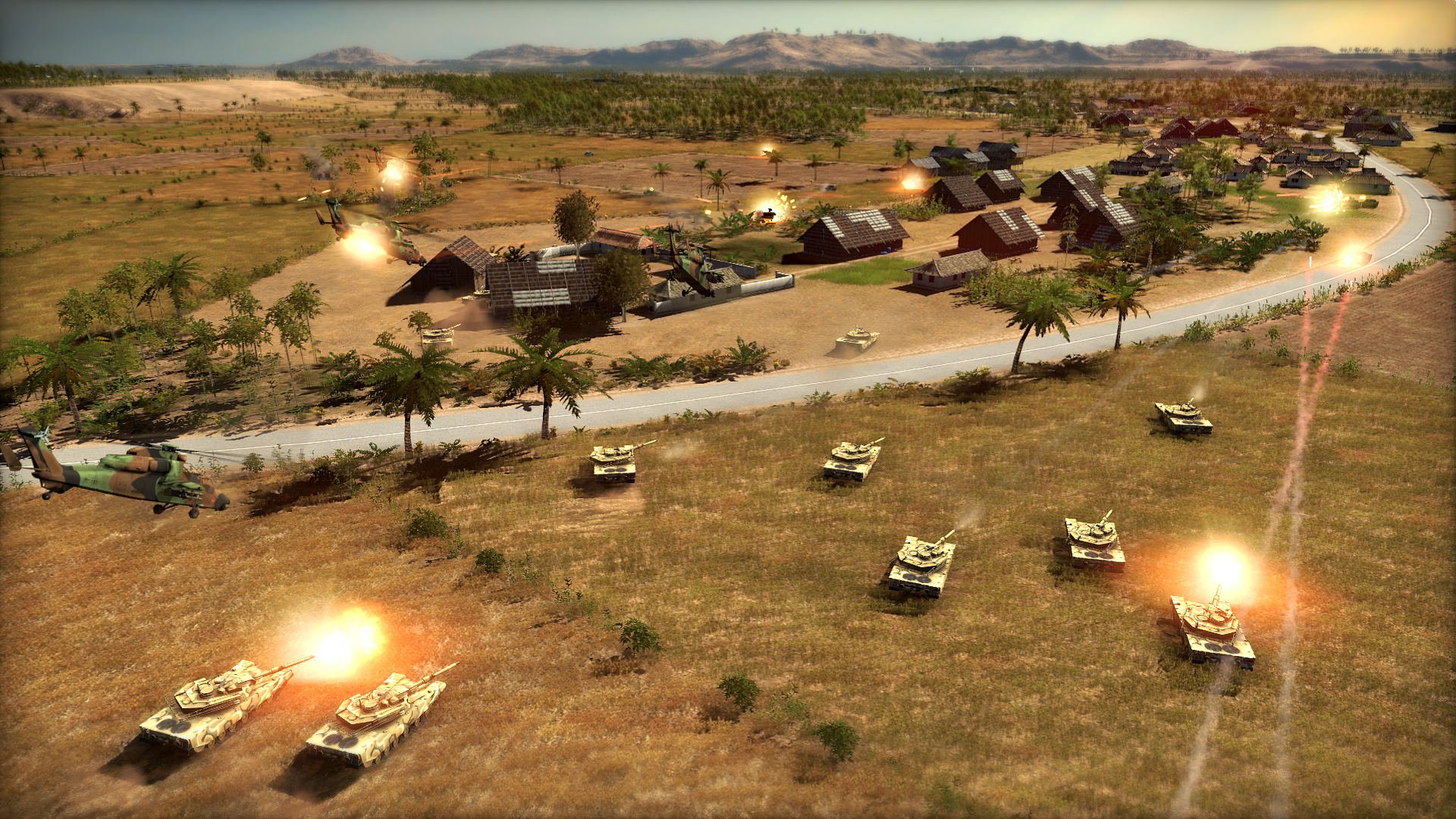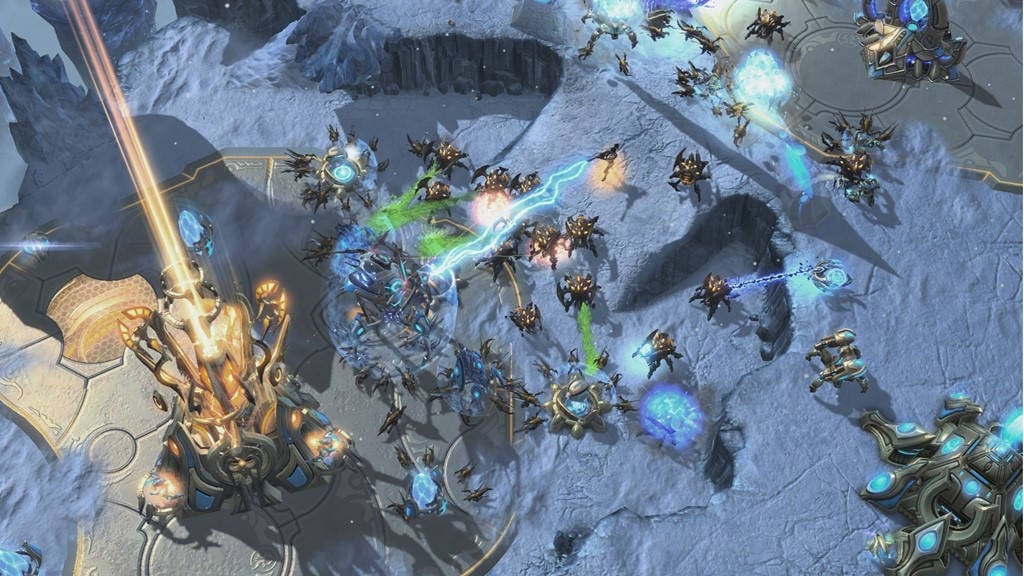Few videogame genres have such a wide appeal as RTS games. Some players are drawn to them for the chance to build expansive empires, others to their historical authenticity, and yet more to the primal joy of imposing commands from your lofty nest above the battlefield. Breezily amass an immense army to crush your foes with the weight of your military might, or rigorously strategise each combat scenario. There’s variety aplenty.
From mad medieval romps, to cinematic sci-fi adventures, to historical simulators, their plethora of settings, themes, and playstyles ensures RTS games offer something for everyone. So we’ve picked out the very best. Some are focused on tactics and the heat of combat, others lean into base-building, and some benefit from elements of traditional wargames. All, however, are absolutely ace.
Once a thriving beacon of design ingenuity and thematic ambition, the RTS genre has taken a bit of a hit in recent years. MOBAs, grand-strategy, and management sims drew audiences to other horizons, leaving real-time strategising a little bare. But that’s not to say we’ve been left with a fallow wasteland – far from it. There still remains a multitude of modern RTS games capable of satiating your needs, and the classics of the past haven’t gone anywhere.
So count your villagers and ready your vocal cords for some full-throated ‘wololoing’. These are the best RTS games on PC:
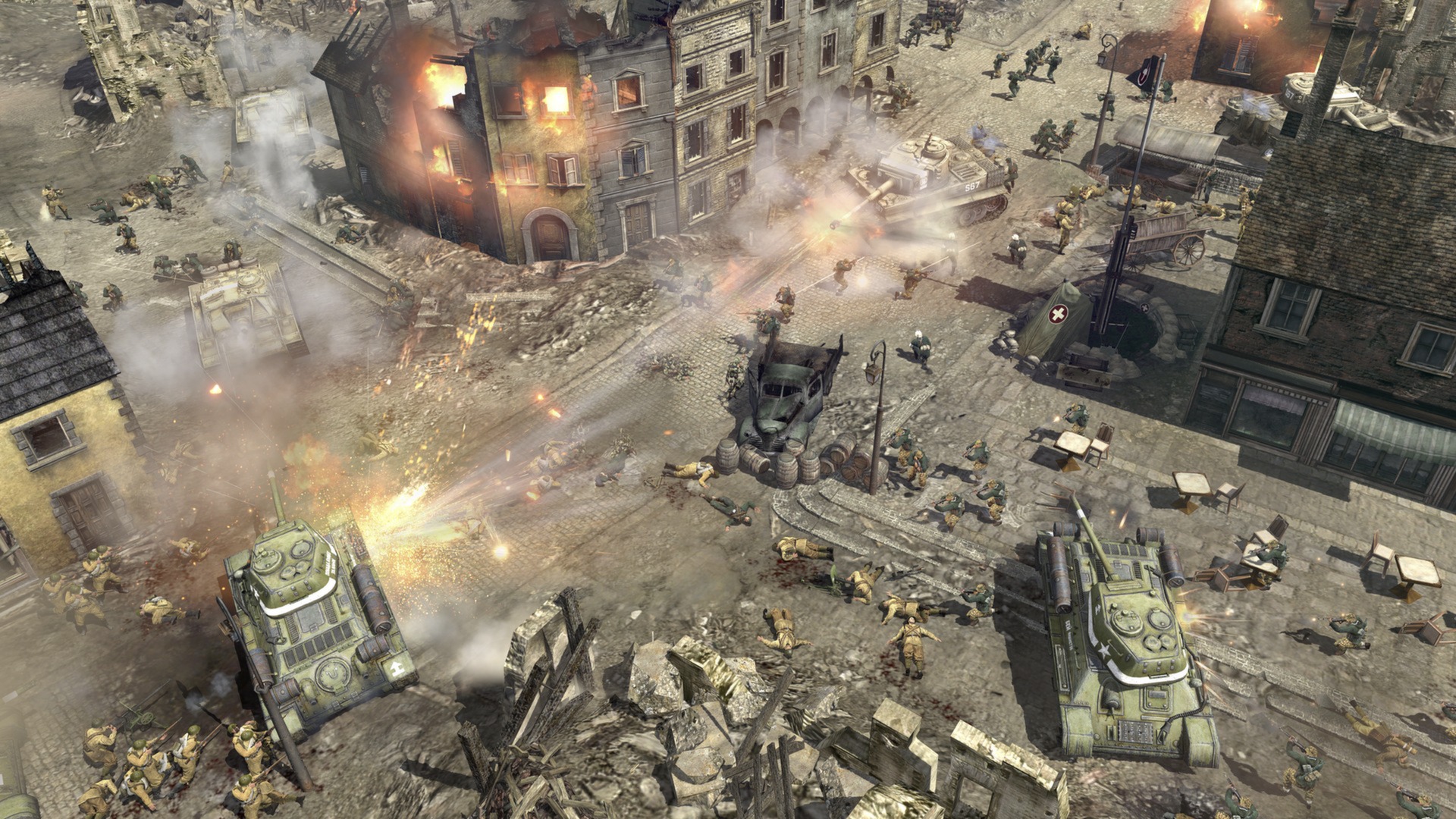 Play now
Play nowCompany of Heroes 2
Suffering from a rocky launch beset with balancing issues, bugs, and overpromises, Company of Heroes 2 didn’t receive the warmest of welcomes amongst RTS fans or veterans of the series’ first game. However, after years of refinement, this World War 2 squad-focused skirmisher has become something of a classic, and goes to great lengths to recreate frenzied battlefield assaults through consistently nail-biting moments.
Involving only limited base-building and concentrating on few, powerful units, Company of Heroes 2 plays as a tactical game of territory control. Its simple but robust cover system has you manoeuvring infantry through hollowed-out buildings and cratered rural fields, tweaking unit positions to evade enemy machine gun nests and mortar fire, while pressing forwards in heroic assaults.
Other times, you’ll be establishing a defensive perimeter, sticking a sniper in that nearby church tower to give covering fire to your engineers on the ground, directing your anti-tank riflemen in a pincer movement to make quick work of that otherwise beastly Tiger, and always making sure to angle your armour correctly, ever fearful that the sides of your tanks might meet the wrong end of a panzerschreck.
All of this makes for intense squad management on the smallest level. Every unit counts, and even a single death in a squad might be enough to tip the firefight in the enemy’s favour.
Balance your forces with heaps of unit variety, and pay heed to their crucial abilities and vulnerabilities – no fear is like the fear of seeing your vulnerable riflemen walk directly into the range of a heavy machine gun nest. Unit upgrades and weapon-swapping provide open customisation, and the game’s central campaign – tracing the Soviets’ defence and counter-assault against the doomed Operation Barbarossa, nicely switches between massive battlefields and smaller, corridor-crawling assaults.
And if you’ve exhausted many hours of fun from the base game, check out 2014’s standalone expansion Ardennes Assault, which expands upon all these elements through additional scenarios, fought across a branching meta-map campaign. We’d even dare to say it’s one of the best WW2 games of all time.
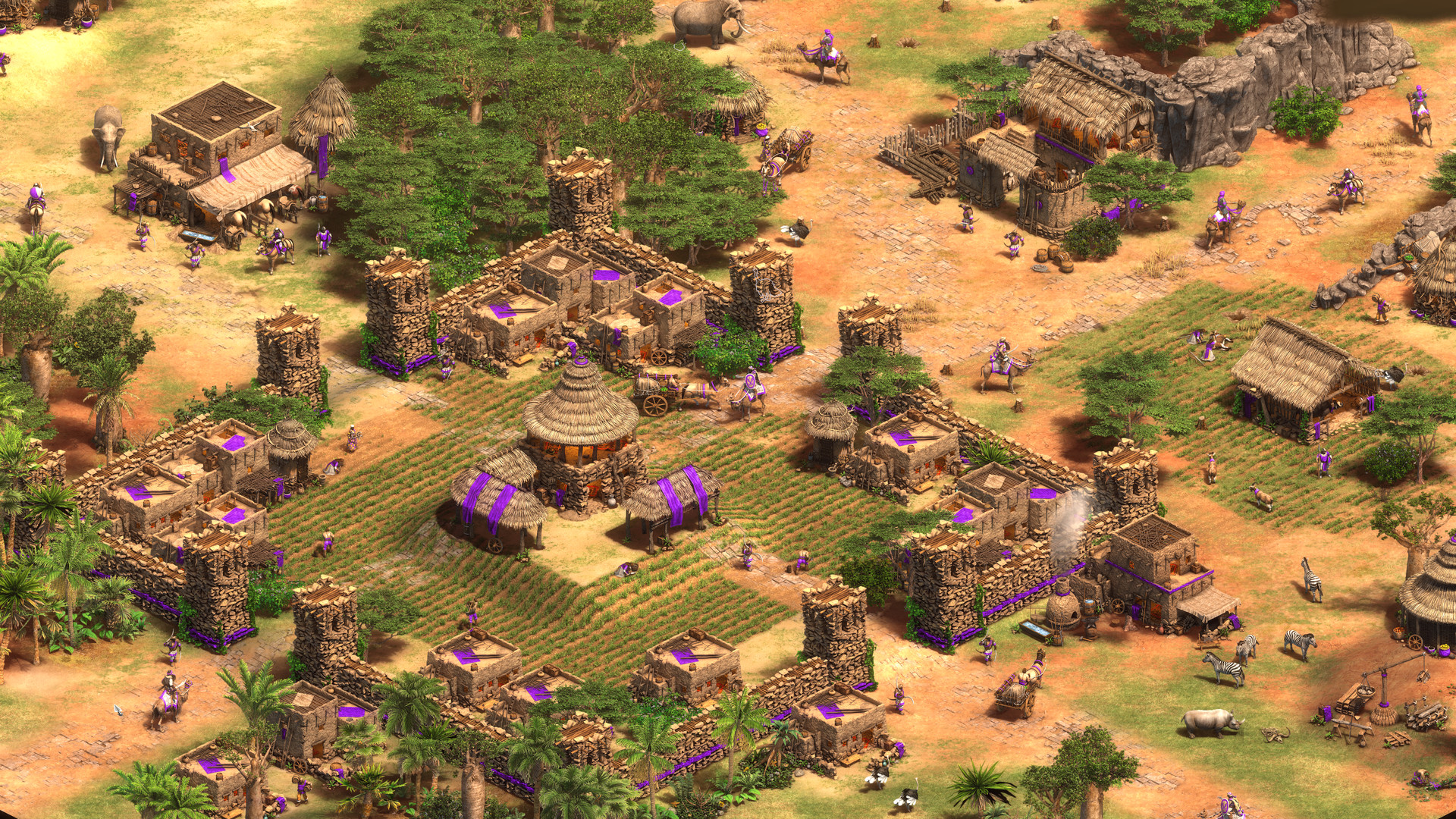 Play now
Play nowAge of Empires 2: Definitive Edition
It simply had to be given a place on this list. Age of Empires 2 long ago established itself as the definitive historical RTS, but, far from complacently relying on players’ memories of their halcyon childhood days spent cavorting across colourful isometric maps, it continues to hold up as refined, engaging, and instantly enjoyable.
Combat isn’t overly complex, but extends beyond simply building the biggest army roster to overpower your opponent. Construct a variety of units to rock-paper-scissors your way to victory, and make good use of civilisation-specific units – from samurai, to elephant archers, to mamelukes – to bring the pain.
Mixed with naval warfare, siege tactics, defensive fortifications, and continuous base-building, skirmishes quickly develop into an onslaught of furious micro-management. You’ll often find yourself heroically commanding your cavalry to push through to the opponent’s town centre, while desperately creating more swordsmen to fend off the enemy archers making mincemeat of your defenceless villagers back at base.
Age of Empires 2: Definitive Edition’s charm comes from its malleable playstyle. Some love to hyper-optimise their progression, knowing precisely how much food and wood to gather before advancing to the Feudal Age, the exact number of houses that should be built during the first five minutes of gameplay, when to launch a harrying raid to stunt the enemy’s economy, or the optimum number of villagers to create at every moment. But others can enjoy a more laissez-faire style of play, languishing in the game’s smooth flow and consistent action.
The definitive edition of the game is exactly as it sounds. Bundling all previously-released content alongside new campaigns, 4K graphics, updated artwork, sweet new tunes, regular updates, and new DLC, it’s never been better, or easier, to jump into the Age of Kings. Impressive for a game that launched over 20 years ago.
 Play now
Play nowWarhammer 40,000: Dawn of War 2
In a huge shift from the first game in Relic’s acclaimed Warhammer 40k videogame series, Warhammer 40,000: Dawn of War 2 dispenses with base-building and resource-gathering to focus solely on the action. Rather than commanding huge swathes of infantry and gradually building a force to overwhelm the enemy, you start with nought but a central squad of valiant Space Marines to gun, slash, and melt your way through hordes of alien adversaries.
And those few Space Marines are all you need. Weapons, armour, abilities, and more can be discovered, upgraded and specialised across a non-linear campaign that explores the depths of slimy wastelands and the decaying core of industrial cities, and formidable squad customisation mechanics allows you to consistently switch up your methods of play. Make strong use of cover and bottlenecks to rain hellfire upon the hordes of Orks and Eldar beelining your units, and plan defensive positions, while drawing upon potent special abilities to lay waste on the field.
Above all, Dawn of War 2 is perhaps the best digital recreation of the Warhammer 40K tabletop game. Its emphasis on unit customisation and squad management better simulates the tabletop mechanics than any base-building would, and relentless violence and gore adequately recreate the exaggerated, exultant action of the Warhammer universe. If nothing else, it’s a joy to watch waves upon waves of hollering Orks fall at the barrel of your heavy bolter.
Command and Conquer: Red Alert 2
Few videogame series are as relentlessly tongue-in-cheek as Command & Conquer, and even fewer live up to the hilariously fanciful Cold War antics of Command and Conquer: Red Alert 2. Charting a hypothetical Soviet invasion of the US, Red Alert 2 hands you control of both nations to defend the superpowers with cartoonish ideological fervour (and missile-armed zeppelins).
But this isn’t an ordinary alternate-history simulator – far from it. Every nation, every character, and every unit presented across the campaign is an obtuse caricature of its real-life counterpart. What starts as a slightly drab, sincere take on heated Cold War tensions, quickly develops into a silly pastiche of overzealous superpower struggles. Your conventional armoured vehicles are joined by electricity-firing prism tanks, your battleships backed-up by hardened battle dolphins, and there’s a cast of colourful characters that are as silly as they are hilarious.
All of these theatrics are made even better by FMV cutscenes (pre-recorded videos of real-life, non-CGI, full-flesh actors) played between missions. The crazed Soviet scientist Yuri and the hot-headed American commando Tanya are loving imitations of the best (and worst) 80s B-movie characters. It’s a near-miracle how much life Westwood Studios was able to breathe into a strategy game.
And the gameplay is a joy to behold. Skirmishing across carefully-constructed maps to fulfil varied objectives, regularly unlocking new units, and facing additional enemy threats at a consistent pace keeps things fresh. Unit paths leave a lot to be desired, and the game’s economy encourages much laboured resource-gathering, but its sheer silliness is enough to keep you engaged.
 Buy now
Buy nowShadow Tactics: Blades of the Shogun
In a refreshing shake-up, Shadow Tactics: Blades of the Shogun brings real-time strategy to the deadly stealth of Feudal Japan. It’s a real-time tactics game, in which players control an elite team of deadly warriors – including a ninja, samurai, rogue, and more – with which you’ll be infiltrating strongholds and mastering stealth. Move your team members across labyrinthine maps and select how to dispatch enemies, as you inch closer to that mission’s objective.
Small in scale but grand in ambition, Shadow Tactics sumptuously marries stealth with strategy, as you leverage the disparate abilities and skills of your team to knock out guards and run around sentries. But be careful not to draw too much attention. If you find yourself in an outright brawl, you’ll soon after land back at the loading screen with your tail between your legs. Paced stealth is the key here, encouraging well-thought battleplans rather than rushed violence.
The game verges on a stealth puzzler at times, challenging you to most elegantly and swiftly overcome linear challenges and choose from the wealth of possible solutions available. Distract enemies and sneak past camouflaged, pick off opponents from a distance using expert marksmanship, or go in for the killing strike, carefully lining up your targets to dance between, in the illustrious rhythm of death. You will feel like a ninja.
 Play now
Play nowSteel Division 2
If realism and authentic simulation of World War II battles is your bag, then make sure to check out Steel Division 2. Taking command of Soviet forces in Operation Bagration, you’ll fight across 1:1 scale battles in kilometre-spanning maps, commanding units so intricately detailed you’ll wonder if you’ll accidentally stumbled into a time-travelling phone box and enlisted in the Red Army (we’re kidding, you would have been conscripted).
On the field, you’ll be overseeing the movements of battalions and supplies from far above the fray. Command amour, infantry, and aerial forces to seize objectives and rout the enemy, paying careful attention to terrain bonuses or hidden enemy forces that may scupper your forward advance. With such large maps, there’s a lot going on, and you’ll often find one battalion has unexpectedly taken a beating while you were busy concentrating on another section of your force, leaving you to desperately regroup.
But Steel Division isn’t purely an RTS. It plays more like a series of real-time battles within a dynamic turn-based campaign – a little like Creative Assembly’s Total War series. Before setting one caterpillar track on the field, you’ll be shifting battalions across its sprawling grand map, connecting supply depots with your front lines to keep troops fresh for the fight, and poring over scores of stats provided for every enemy unit – internalising the strengths of their weaponry and pitfalls of their training.
Steel Division is the soul of hardcore hex-and-counter wargame, converted to the fluidity of a fully-realised 3D on-screen battlemap, and spruced with some real-time flavour. Its emphasis is on the operational battlefield, though, and functions as a perfect mid-point between hardcore wargamers and traditional RTS-lovers.
 Play now
Play nowCommandos: Behind Enemy Lines
We couldn’t mention real-time tactics without picking out the godfather of tactile squad-scale shooters – Commandos: Behind Enemy Lines. Taking control of a crack team of WWII Allied special operatives sneaking around the enemy camp, you’ll be shooting, crawling, stabbing, grenading, rolling, falling, and crawling some more as you infiltrate enemy strongholds to steal intel and blow up strategic points of interest. Oh, and kill lots of people.
Your units are continuously out-gunned and out-manned, having to rely on their tactical wits to evade or stealthily dispatch combatants. Its gorgeous isometric environments span everything from castles to U-boats, and the array of commandos in your squad each bring different abilities to the mission – the Spy can equip enemy uniforms and waltz around as an officer to enter covert areas or provide a distraction, while the Marine can dive underwater and pilot boats for aquatic infiltration.
It’s old and doesn’t have the same smooth pizzazz as many of its modern counterparts, but its isometric art style helps preserve an aesthetic attraction, and the Steam version of the game still supports online co-op play. Brilliant for some nostalgic, tactile fun.
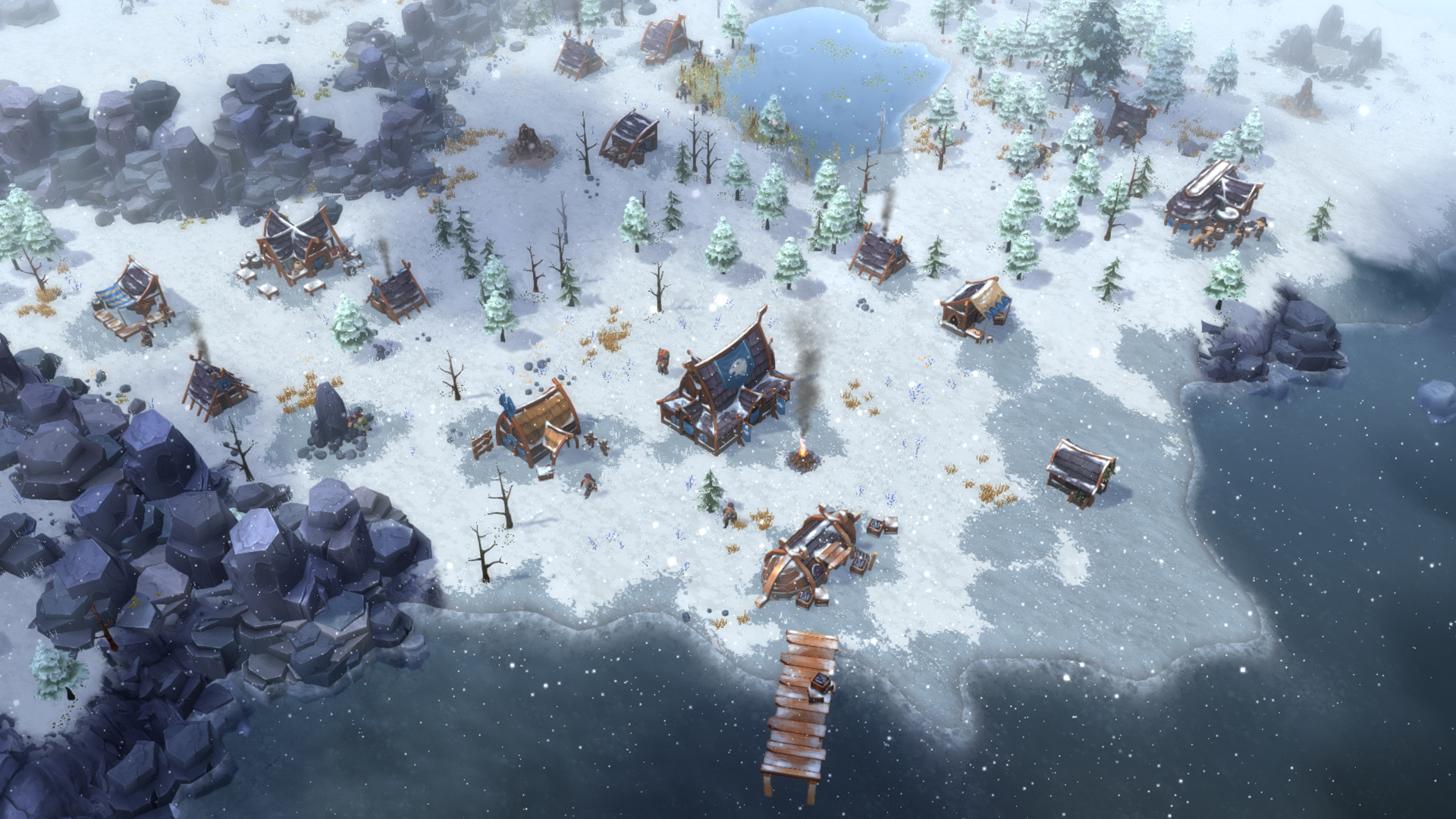 Play now
Play nowNorthgard
There is one eternal truth – not enough videogames centre around Vikings (yes, we’ve seen Assassin’s Creed and Valheim, but the point stands). Which is odd, because the Norse people’s mythology, aesthetic, and penchant for overseas settlement are ripe for a rollicking adventure across an icy tundra populated with deadly magical beasts. Northgard gets this, challenging you to settle and build a colony on an uninhabited island, provide resources to satiate your Vikings’ demands, expand your settlement, and keep watch against all that lurks in the snow.
The basics of Northgard will be familiar to old hands of the historical RTS games of the early 2000s. Starting from a humble town centre with a handful of villagers, you’ll collect enough resources to construct a base of operations from which to attack enemy monsters and rival Viking holdfasts, while defending against their advances.
The selection of playable clans each bring particular strengths and playstyles – some hot-headed warriors, others peaceable diplomats – and unique units, including Valkyries or Berserkers. The clans aren’t so distinct as to revolutionise gameplay at every turn, but bring enough variety to keep things fresh.
But Northgard places a bigger focus on base-building and resource management than the Age of Empireses or Settlerses before it. Ensure you have supplies to survive the winter and expand your colony sparingly. If you spread yourself too thin, your resources might wane and fizzle, leaving you shivering and vulnerable in the chill winter winds. Its cutesy visuals also lend an undeniable attraction, and it’s a joy to watch your cartoonish Viking warriors bound across the fields.
Wargame: Red Dragon
Serious, intense, and overflowing with operational possibilities, Wargame: Red Dragon does a superb job of translating the best parts of the wargaming hobby into a streamlined tactical operation that is as attractive as it is spectacular. The scenarios in its lengthy single-player campaign are large and weighty, tracing an alternate-history scenario in which the Soviet Union doesn’t collapse in 1991, but becomes stronger than ever, wielding the collective might of its extended Bloc against the West.
On the battlefield, it plays much like a typical wargame. Land, naval, and air units are selected and deployed before battle starts, with each opponent lined up at either end of a gargantuan map. Move units to exploit their flanks, and coordinate comprehensive assaults to break enemy ranks.
Bear in mind, Wargame: Red Dragon can be overwhelming. With 17 playable nations fielding a total of 1,450 units, the game is not easy to dive into for quick skirmish, nor is it intended to be. Learn your units’ strengths, understand the combat advantages that terrain may provide, and master (slowly) simultaneously managing your naval, ground, and aerial forces. If you do, you’ll be rewarded with one of the best-looking digital wargames around.
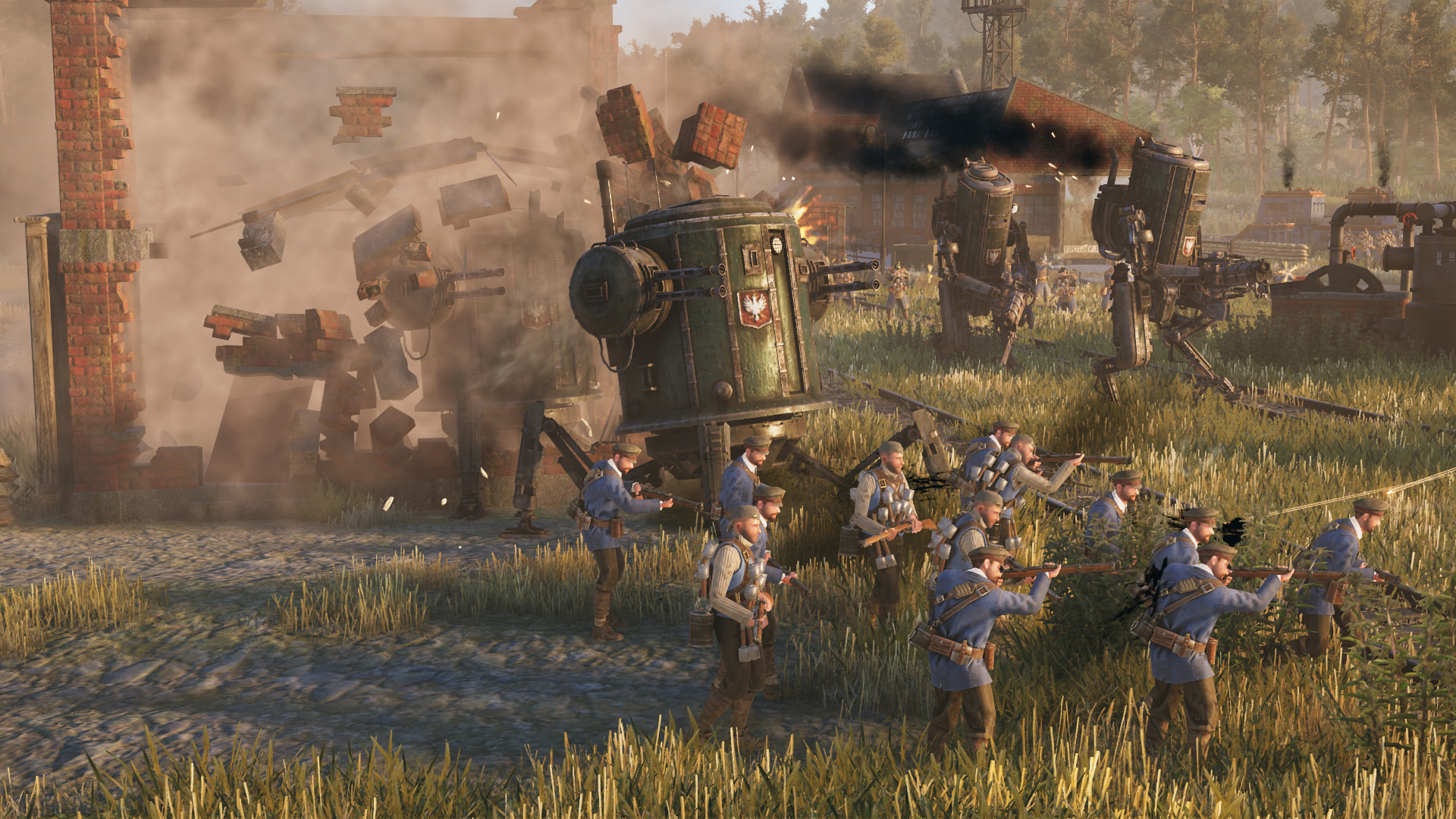 Play now
Play nowIron Harvest
The ravaged battlefields of World War 1 are familiar to the popular imagination. Hollowed villages left only with the shells of their former homes; crisp husks of burning vehicles long since abandoned, mile-long stretches of narrow trenches. And, of course, bipedal dieselpunk mechs, hulking across fields to level trees and brazenly crush buildings under their feet.
This, at least, is Iron Harvest’s view of history. Set in the 1920s alternate history world of artist Jakub Różalski, previously best known as the setting of acclaimed strategy board game Scythe, the game essentially functions like Company of Heroes, but with added mechanical walkers. Squads must be individually managed to capture resource-generating territory points, and a similar cover system fuels most of the game’s tactical proceedings. Weaponry can be changed and upgraded, but the most focus is on the fight, with base-building taking a back seat.
The game’s primary appeal, of course, are the mechs. There’s the scrawny one that wields a rifle and musket, the spidering one that fires twin sub-machine guns, the stocky one equipped with a gatling gun, and a fair few more. A central campaign provides an enjoyable story, and the opportunity to play each mission with a co-op buddy is a welcome addition to an otherwise competitive-heavy genre.
A few bugs and unit pathing issues at launch held Iron Harvest back. Most have been resolved now, however, and the game makes for quite the dieselpunk caper.
Starcraft 2
A behemoth of the genre that deserves every accolade placed upon it, it’s difficult to find an RTS game more refined than Starcraft 2. Best known for its once-vibrant esports community and international championships that were as grandly obtuse as they were violently serious, its multiplayer scene remains strong today. Although be warned, if you’re jumping in the game for the first time, don’t be surprised to be overrun by Zerglings before you collect even your first barrel of vespene gas.
But the single-player is too often overlooked. The Zerg, Protoss, and Terran all play as wonderfully different factions with enough mechanical differences to match their visual disparities, and sufficient shared content to make mastering each race an enjoyable challenge rather than a cumbersome chore. The game’s ongoing narrative, while not revolutionary for the sci-fi genre, is notably engaging and the best example of an integrated plotline in any RTS game around.
There’s plenty of big guns, alien horrors, and archaic spiritual technology to suit anyone’s sci-fi leanings, and its visuals have retained their pop after ten years. Even better, Starcraft 2’s Wings of Liberty campaign (the first game released in the Starcraft 2’s trilogy of launches) went free-to-play back in 2017, alongside access to unranked multiplayer. Now you have no excuse not to meet the Queen of Blades.
Source: Wargamer



